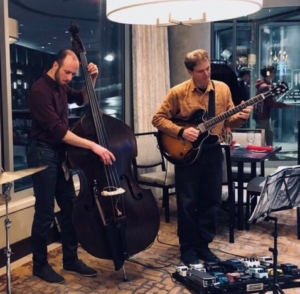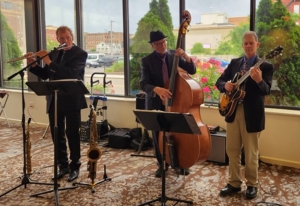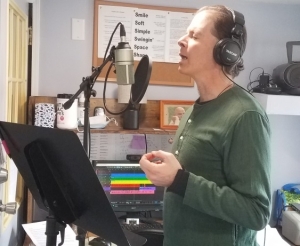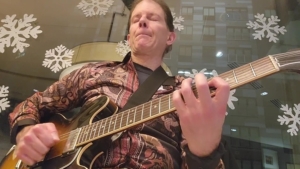Managing the Ups and Downs of a Musician’s Life
The On and Off Seasons
For many musicians, there’s a definite rhythm to the year—a busy “on” season and a slower “off” season. Typically, May through October brings a surge of weddings, outdoor events, and festivals, while the colder months tend to quiet down, except for a few holiday parties in December. The contrast can be so extreme that musicians must learn to manage their energy, mindset, and expectations in both periods and navigate the transitions between them twice a year.
brings a surge of weddings, outdoor events, and festivals, while the colder months tend to quiet down, except for a few holiday parties in December. The contrast can be so extreme that musicians must learn to manage their energy, mindset, and expectations in both periods and navigate the transitions between them twice a year.
In my blog “7 Gigs in 7 Days,” I talked about an especially busy week that kicked off my summer season. The first day of that week happened to be the summer solstice—the longest day of the year—which felt symbolic of the months ahead. Summer, of course, marks the height of activity. What I didn’t write about then was how I felt on day five of that week: the only day without a gig. It turned out to be the hardest day of all, and it revealed a lot about the cyclical nature of a musician’s life.
Highs and Lows of the Busy Season
After four gigs in three days, I woke up Monday morning feeling excited and inspired. I dove into writing that blog, updating my marketing, and tackling other creative tasks that I enjoy. It’s fulfilling to live the life I dreamed of as a teenager, and now, in my 50s, I feel I’ve hit my stride. I can deliver strong performances across different styles and consistently receive 5-star reviews—something I’m deeply grateful for.
But by midday, my focus started slipping. I began multitasking, losing track of time, and almost being late for teaching my first class of the day. It hit me then how mentally and physically draining the “on” season can be. After a short meditation break turned into a half-lucid nap, I understood why touring musicians might be tempted by stimulants to keep going or depressants to wind down. The lifestyle demands intense energy regulation, and self-care becomes essential.
Strategies for Maintaining Balance
 That’s why I prioritize rest, nutrition, exercise, and meditation. The long drives, gear setups, performance energy, booking logistics, and administrative work can add up quickly—especially when paired with teaching or other responsibilities.
That’s why I prioritize rest, nutrition, exercise, and meditation. The long drives, gear setups, performance energy, booking logistics, and administrative work can add up quickly—especially when paired with teaching or other responsibilities.
Sometimes balance means making small sacrifices, like spending money on an overnight stay rather than driving home exhausted. It’s a constant process of managing energy output and recovery. The shift from high activity to quiet downtime can also be jarring—especially for those who crave the energy and connection of live audiences. Maintaining equanimity through it all requires conscious spiritual or grounding practices.
Adjusting to the Off-Season
When winter arrives, the challenge flips. The pace slows, and it can sometimes feel isolating. To stay musically and emotionally active, I focus on three main areas:
Engaging with the Music Community
- Attending jam sessions and collaborating with other musicians
- Taking smaller restaurant or bar gigs to keep my playing sharp
Staying Productive
- Keeping busy with teaching, whose busy season is November to May, partly because of the school calendar where people are off for the summer and resume in mid-autumn.

- Working on specific musical projects. Several of my albums were recorded in the winter, such as One Small Step, Not From Brooklyn, For Music Geeks Only, and Sketches. Having a specific task at hand, especially one that can be done at home such as composing or recording, can help the downtime pass more enjoyably and productively. This past winter, for example, I spent arranging the tunes for my Latin Jazz/Salsa/Afro-Cuban band Sunset Salsa.
Personal Well-Being Strategies
- Keeping a regular exercise schedule, including jogs and hikes outdoors when it’s not too icy.
- Avoiding overeating, especially heavy foods rich in carbohydrates.
- Getting to bed as early as possible, even as early as 7:30 pm in the winter. Sleeping as close as possible to the sun’s schedule is the most refreshing, in my opinion.
- Eating small amounts of dark chocolate and having rooibos tea.
- Using a winter lamp that gives off natural sunlight. This was recommended to me by a therapist many years ago, and I feel it helps my overall mood during stretches when my body is not exposed to sunlight for several days or even weeks at a time.
- Reading good books. Winter is a time of reflection so that new growth can more easily follow in the spring. Some classic books that could be read in the winter are Stillness Speaks by Eckhart Tolle and Be Here Now by Ram Dass. This past winter, a friend recommended Power vs. Force by David Hawkins, and The Alchemy of Inner Work by Lorie Dechar, both of which I enjoyed. I also really liked The Creative Act by Rick Rubin and I wrote a blog on it as well one on the Hawkins book.
- Writing and journaling more. I write in my journal year-round, but in the winter, the entries are more self-reflective and lengthy.
- Enjoying low-key family time. Just being with close friends and family can be heartwarming in winter, even if the activities are limited to indoor ones, such as cooking, playing games, or watching movies.
Embracing Seasonal Rhythms
In addition to managing each season for what it is, musicians must adapt to the transition to and from the busy season. For example, I remember having to remind myself to leave an extra 30 minutes early for every gig at the start of the busy season to allow for x-factors such as traffic, wrong turns, or tricky set-ups. Or perhaps it’s time to take inventory of all your gear and ensure everything is working properly.

As for transitioning out of the busy season, a musician might write holiday cards to all the clients who hired them that year or craft marketing messages to venues they may want to establish or maintain a relationship with in the upcoming year.
Now that I’m living in Myrtle Beach, SC, I’m hopeful that the milder climate will help smooth out these seasonal extremes. While the contrast between “on” and “off” seasons may be less dramatic, I still value the rhythm they create. The busy season brings excitement, connection, and growth, while the slower months provide space for renewal, reflection, and creativity.
In the end, each season offers its own kind of nourishment. Learning to honor those cycles—rather than resist them—can make the musical journey more balanced, sustainable, and fulfilling.
—
If you’re considering live music for your event, book a free music consultation with me or reach out via the contact page for a quote.



